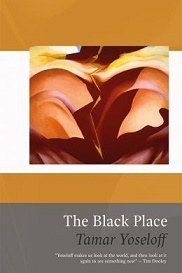Review of The Black Place by Tamar Yoseloff, pub. Seren 2019

I dream
of grey, of urban sprawl, in all
its stupendous misery.
("Emoji")
Tamar Yoseloff has long been known as a poet who conjures poetry out of urban landscapes, often in a state of decay. So this quote, at first sight, is no surprise, but appearances partly deceive: although the actual landscape of London does figure largely in this collection, so does the landscape of the human body, which, with its inevitable malfunctions, is observed in much the same forensic detail as some rusting vehicle or abandoned building.
A diagnosis of cancer, in the opening poem, leads to thoughts on mortality and memories of the dead, particularly a mother. The Grenfell Tower disaster, happening while the narrator undergoes treatment, entangles the public with the personal in "Cuts", with its brilliantly punning title:
On the street the air is strange;
my secret's blown. Fag ends stub
the pavement, the Standard blasts
Inferno – a tower fixed in flames.
There has to be someone to blame.
Here, as in the previous quotes, there is a great deal of soundplay. The alliteration, the half-internalised, sometimes semi-accented rhymes in "Emoji" (sprawl/all, grey/misery) recur in other poems, notably "Disappointment" and "Holiday Cottage", and in the latter they are getting quite close to cynghanedd:
Rain saddens brick, a sodden blackbird
huddles under shrubs. We hunker down
in the stygian kitchen, where even
the knives don't shine.
I don't recall quite so much of this in her former collections, and if I were feeling fanciful, I would speculate that an increased interest in rhyme and form can sometimes mirror a desire to make sense of something, to bring a baffling universe into some kind of order. Whatever the cause, the sound-patterning layers and deepens the poems.
The subject matter, the vision, of these poems may sound dark, and so in some ways they are, but the grimness is offset by the poet's characteristic wry humour. Whether observing the social media reaction to Grenfell ("we've become experts on cladding"), nailing the irony of an ancient jade coffin as "the emperor's new suit", or resolutely maintaining a sense of proportion about personal matters ("Everyone dies – get over yourself"), the voice is consistently unsentimental, laconic, serious without being solemn. It is also a voice of great clarity and accuracy in its choice of words. That "stupendous" misery; the agonisingly perfect verb in "Fire laddered the walls". Perhaps this shows most clearly in the endings. I seem to see far too many poems in which the endings look strained-after, trying to make an impact but not really justified or emerging naturally from the poem. Here they are part of the voice, the natural and often powerful climax of an organic process. This is the end of "In Clover", about a protagonist who collects four-leaved clovers:
She started when she was seven. An auspicious number.
The casual hunt grew to obsession as she got older.
And now she can't face the world before her, only
the ground we will all go to.
Published on November 05, 2019 04:26
No comments have been added yet.



